Raising backyard chickens for beginners is exciting and very rewarding. Chickens can be seen as pets and/or a source of food. Either way, chickens can give you joy, a sense of fulfillment, and eggs. If you have kids, the fun is exponentially multiplied as chickens are very social. It’s also a great way for children to help with chores as well as involve them in 4-H.
While it may be overwhelming in the beginning, there are many tips to make things go easier. Soon you will see how simply entertaining they are with their different personalities. If you live in an area which permit chickens, they are a great choice.
Backyard Chickens for Beginners
The most common questions people ask is if chicken rearing is easy, and if it can it be done on a shoestring budget. Raising chickens is easy. There are just some basic things for you to know. After that, everything about raising chickens can be self taught – no special training needed. There are also great books for raising chickens for beginners.
Raising chickens is inexpensive
Raising chickens is cheaper than having a dog in the house. The cheap food, chicken coop shelter construction options, pet care necessities, and other related expenses make backyard chickens an affordable endeavor.
Many of the initial expenses are just one-time purchases: coop, fencing, watering system and feeders. This backyard chickens for beginners guide can give you confidence through the process of raising hens.
What are backyard chickens?
Backyard chickens, sometimes called urban chickens, are fowl breeds that are raised in a typical backyard. These chickens are commonly seen as source of food with the eggs they produce and the meat they provide as they mature and their egg production starts to decline.
Keeping chicks is a rather trending backyard project today as people are more concerned where their food comes from. Raising chickens in their own backyards give people more control of the quality of eggs produced.Perhaps they choose to free range the chickens and/or to feed them with organic feeds only. Both of these choices will significantly increase the health factor of the eggs and also the meat from the chicken.
Having a steady supply of eggs is also important for those who are interesting in alternate food supplies. This is important in cases of prepping for emergencies and for food shortages.

Chickens are easy to feed
Backyard chickens are omnivores which makes them easy to feed. They can eat grains, fruits, vegetables and insects. To better manage their diet, you should provide them with well-balanced meals that have all the vitamins and minerals they need to reach their potential weight.
This also gives them a boost to lay more eggs.
Chickens are easy to take care of
You can shelter (best chicken coops) and house adult chickens in a DIY chicken coop and if you prefer to free range them, you can also integrate a chicken run with the coop.
The chickens only need a steady supply of water and nutritious food. Learn how long can chickens go without food and how long chickens can go without water if you need to go away for a day or two.
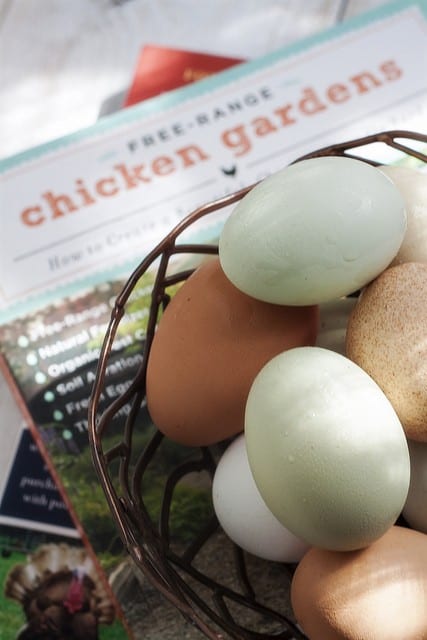
How to raise chickens?
There are a few pointers you need to consider when you plan to raise backyard chickens for beginners in your backyard. These tips can make it a lot easier for you to start and sustain your chickens. Something to consider is how many chickens you want to have and how much room they will have.
Where do you live
If you know someone in your area who raises chickens, you may ask them what types they’ve had success with. This will be particularly important if you live in a geographical area with more extreme climates or seasons.
Consider areas in which chickens will need to ensure long winters with cold temperatures. According to Backyardchickencoops, chicken breeds with small combs and heavy feathering do well in cold climates.
Come examples include Plymouth Rock chickens and Australorp. It’s even more important to choose the right breed if you live in a hot climate. Heat-hardy chickens will fare much better than other breeds.
Fresheggsdaily.com suggests choosing a chicken breed with a larger comb and smaller body mass, such as the Leghorn, Easter Egger, Welsummer, Golden Campine, and White Crested Black Polish.
And if you have both extremes — hot and cold – it’s best to choose the heat-tolerant breeds as most chickens do better with cold than heat.
Choose the chicken breed
In addition to considering the climate, there are other factors to consider. Although all chickens can be raised in a backyard, there are a few breeds that are more suitable for backyard chickens for beginners.
Rhode Island Red
The Rhode Island Red is a breed that can reach an average weight of 6.5 lb. It has dark red feathers and adopts in a small flock very well. Known to be a breed for laying eggs, this chicken can produce brown eggs.
Wyandotte
The Wyandotte chicken is another breed that is seen to be dual purpose (for eggs and meat). With an average weight of 6.5 lbs, the Wyandotte can thrive in small flocks and can do well in rugged conditions. They are known to have a good disposition and are available in different colors.
Ameraucana
The Ameraucana is available in many colors. It lays green eggs and can produce more for a longer period of time compared to other breeds. This breed is easy to handle and can tolerate all kinds of climates very well.
Orpington
Another easy-to-raise chicken breed is the Orpington. The hens of this breed can reach up to 8 pounds in weight. The greater weight makes it very ideal for eggs and meat. Orpingtons come many color varieties, including Lavender Orpington and Buff Orpington. They are ideal for cold places.
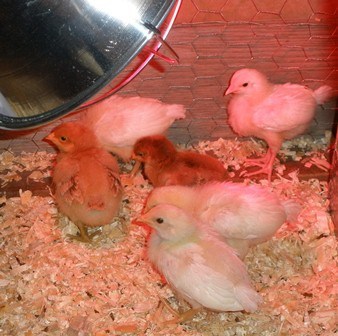
Choose chicks or adults for raising backyard chickens
Decide if you want to start with chicks or adult chickens. This is your preference. Some of the key things you need to consider are the cost. Adult chickens would cost more upon purchase but you can already expect them to lay eggs as soon as you house them in the coop.
Incubating Chicken Eggs: The Process and Requirements
Chicks you raise together may get along better than adding chickens who are already grown. Buying chicks is a cheaper option but you also have to factor in making a brooder for them, and feeding them thru adulthood.
You need to wait up to 6 months before you can have some eggs from the chicks. Raising chicks, however, can be more engaging for the family.
It can teach your kids more things about caring for animals and learning about agriculture. Buying chicken for your backyard can cost under $10 to $30 for each depending on the age and the breed you decide to buy.
Choose where they should live
Choose the best place to house your chickens.
Choosing a brooder
Chicks need to be in a brooder first. The brooder must be kept indoors. The most ideal for the brooder is in the garage. A brooder can be a DIY project and can cost up to $70 including the necessary lighting.
Ideal lighting is a 250 watt lamp that can produce enough heat for the chicks. Also consider heating panels which are becoming more popular than heat lambs because they are safer. Brooders help your chicks thrive in their ideal temperature which is usually set at 90 degrees F. This temperature is regulated and will be decreased slowly until the chicks are ready to be moved to the coop outside.
Choosing a chicken coop
If you are buying adult hens, then you only need to expend for the chicken coop, the fencing, and overhead netting. If you are comfortable working with wood, then you can secure coop plans and do the construction and sourcing of materials yourself.
Many prefer to buy a coop that is easy to assemble. It is easier, and you will be sure everything lines up correctly. There are great chicken coops available. They are easy to put together.
Buying a chicken coop will secure your chickens for a long time. It’s also generally a purchase you make just once.
Ready-made coops also have better designs and should be a more cost-efficient housing for your chickens. There are many to choose from online. They are also usually made from materials which you can easily hose off to clean.
If you are handy, and you have recyclable materials in your backyard (restoring a rural backyard), you can always draft your own coop plans and construct it from scratch. Be sure to have some buffer time just in case you fail to construct a working coop for your chickens.
If the coop doesn’t include chicken nesting boxes, you can buy or build nesting boxes yourself. Consider also adding a chicken run or areas the chickens can free-range safely.
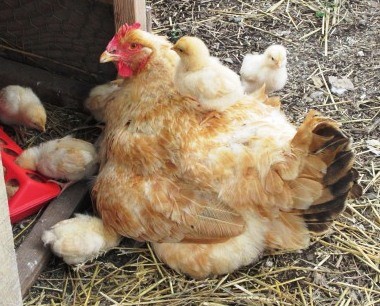
How to take care of chickens
Taking care of chickens doesn’t just stop with feeding them daily. It also means that you have to protect them against predators and climate changes as well. Chickens are won’t do much against large predators as backyard chickens are barely trained to fight nor are capable of defending with their own claws and beaks.
Protect against predators
Be mindful of predators in your area. No matter where you live, it’s best to provide coverage on the top as well. Coyotes, bobcats, hawks, raccoons, and other predators can easily access your chickens from the top.
Protect against climate
While some chicken breeds are better suited to hot climates or cold climates, no matter what breed or different types of chickens you decide to keep, you must still consider how to protect them from the weather, including rain, hail, sleet, snow, cold and heat.
It’s important for you to provide a source of shade for them which is the best way how to keep chickens cool. Also, be sure to have an area for them to keep warm and dry in the winter (frostbite is common, especially on large combs and on chicken breeds with feathered feet) and dry in the rain. Learn about how cold can chickens tolerate and easy ways to keep them warm without electricity.
Choose what the chickens will eat
Feeding chickens
Decide the kind of food your chickens eat. One of the best ways to feed chickens is just to let them loose and allow them to feed off from your backyard.
When you raise free range chickens, you are giving them more space and the freedom to source food on their own. This is a good option especially if you have a sizable backyard as this can significantly reduce your food expenses for the chickens.
This option, when complemented with organic feeds, also assures you with an organic chicken which should provide healthier eggs and meat. Many people give their chickens their leftover produce, including watermelon and lettuce.
If a free range flock is not practical due to predators, terrain or space, chickens are easy to feed.
Complete feed
Another option is to give your chickens Complete Feed. You can get it at a feed store. This will help you ensure you are giving your flock a nutritionally balanced diet.
Scratch grains
You can supplement their diets with Scratch Grains. However, you should do this after they’ve completed their meal, as you don’t want them to get their nutrients only from scratch grains.
You can spread them on the ground for the chickens to forage. Some examples include rolled, cracked, or whole grains, such as wheat, oats, barley and corn. It’s also important to provide a grit source to help them break down the grains.
Different stages
A hen already laying eggs demands another kind of food with a different composition. A layer feed has higher calcium content. This will ensure that egg production is sustained.
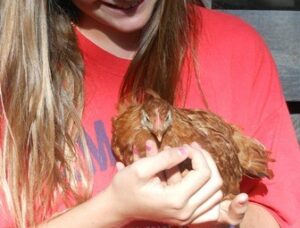
Feeding chicks
If you’ve decided to start with chicks rather than buying hens, you must use starter feeds which are made up of 20% protein. Use this for the first 6 weeks for the chicks. What to feed baby chicks after hatching
You may choose the medicated variety which has anto-ciccidiosis drug, an essential thiamine blocker. This may prevent the chicks from getting the disease but will not offer complete immunity.
From the starter feeds, the pullets will move to a grower feed. This should allow the chicken to grow at an appropriate pace until they are ready to lay eggs.
This feed is used from the 6th week of the chicks (the time they leave the brooder) to their 14th week. There are now starter/grower feeds by some feed makers which should make feeding easy.
Install a feeder
To make sure that the chickens are eating properly, buy and install a chicken feeder for them. You will appreciate having a feeder, especially in the colder winter months or when you go away for a weekend.
A good chicken feeder will help to be sure you are minimizing waste. You have to consider the fact that different chicken breeds have different appetites so you need to be sure that you are not feeding them too much or too little.
Chicken appetite is also affected by the seasons. In the hotter months the chicken can consume less food while in the winter months, chicken tend to eat more.
Consider these appetite fluctuations to better manage your feeding patterns and volume.
Install a waterer
It’s important to have an easy system for your chickens to be able to access fresh water. This will save you time from having to change out and refill the water daily. Having several chicken waterers will help reduce competition and will also help ensure even the less dominant chickens in your flock will have access. Chicken waterers should be designed so they are easy to clean and to refill. They should also not be able to tip over, etc. It’s important for chickens to stay dry in cold weather.
Keep the chicken coop clean
Many people start with raising chickens in a coop lined with newspaper on its floor. Although this is a convenient option, it doesn’t help to absorb the dirt and manure inside the coop.
Also the newspaper, when exposed to moisture, tends to be slippery for chickens. This can create health issues for the hens in the long run. Instead, using another material, such as sand, straw, hay, or pine shavings for the bedding, making sure it’s at least 4 inches in depth. Make sure that your chicken coop is always clean. This should prevent diseases to hit your flock. Learn about using pine shavings for chickens as there are some health risks.
Learn about the common chicken diseases you should know about and how to treat them. This will also ensure your chickens are always clean, should your children touch them.
Sanitation is important as it can affect the overall health and mood of the chickens. It’s important to keep up with the maintenance. Even when you clean regularly, wash your hands thoroughly with soap after any contact with the birds, coop, after feeding, etc.
Regularly replace the beddings you use in the coop as this helps keep the chickens clean. This also controls the smell of the manure of the chicken.
Remember to wear a mask when cleaning the coop and its outside spaces to prevent you from inhaling the dust and feathers of the chickens.
It is best to schedule a general cleaning for the coop and its surrounding areas. This includes steps like clearing the coop with all the bedding and hosing down all the surfaces. Most of the coop kits you can buy online are easy to hose down.
Applying anti-mite solution during winter time is also a good practice. This keeps parasites in control in the cold months. This is when the hens have to stay confined inside their coop.
Regular cleaning
Remember to clean the feeder and waterer too as these can be prone to dirt and mold growth. You have to remember that chickens will drink more water when it is clean and less when it is dirty.
This can lead to dehydration and can make the chickens sick or die in a very short time. Also, always remember, the better their environment, the better the eggs.
Manage chicken manure
Another Backyard Chickens for Beginners tips is about managing chicken manure is all about minding the bedding. Consider that it absorbs both the manure substance and the moisture that goes along with it.
Chicken manure is essentially made up of up to 85% water. This can be a huge source of problem when you are dealing with heat, moisture, and also humidity.
The solution is just to make sure there are enough pine shavings inside the coop. It’s easy to shovel the soiled shavings and replace with new ones.
In the meantime, pine bedding must be stirred regularly to make sure the manure is not left on the top of the bedding. This produces the odor especially in the hot months of summer.
You can easily toss new pine shavings to the coop to make sure there are enough absorbent materials in there. Also, the soiled bedding is a great source of natural fertilizer. If you have a vegetable patch in the backyard this can make your chickens a huge part in your garden’s sustainability.
Nest boxes and eggs
As soon as your backyard chickens start to lay eggs, you need to learn how to best harvest them. The first thing you need to be mindful of is to make sure that the nest box in the coop is always clean.
A clean nest box minimizes the risk of soiling the eggs too much even before you have the chance to retrieve it. The nest box must also be cushioned so that egg damage is minimized.
The more hens you have inside the coop, the more chicken nest boxes you need to have in there to prevent egg overcrowding. Too many hens sharing on the same box can force other hens to lay eggs outside the coop.
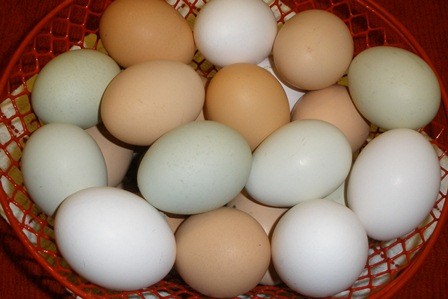
You have to check for eggs early in the coop. Do this regularly throughout the day. You will reduce the risk of the chickens soiling the eggs. Unlike eggs you buy at the store, you don’t need to refrigerate the eggs right away.
Raising backyard chickens for beginners
Once you plan out your space, the chicken breed, and how many chickens you will have, you can decide if keeping a rooster is for you. Then you can enjoy the fun of picking out chicken names for your feathered flock.
This backyard chickens for beginners tip can help you get the most from your hens and their eggs.
Also consider your area of land and if you can consider miniature cattle breeds and a livestock guardian animal to complete your homestead.
Related Articles:
- 9 Things to Consider Before Raising Chickens
- How Much Space Do Chickens Need
- What I Wish I Knew Before Getting Chickens
- Best Chicken Feed Options for Your Flock
- Comparing the Best Chicken Swings
- Water Your Backyard Chickens: Watering Systems and Ideas
- Best Chicken Breeds for eggs, meat or both
- Best Chicken Toys for Entertaining Your Backyard Chickens
- 10 Realistic Ways to Overcome Food Crisis
- Best Chicken Coops Reviews
- Chickens Laying Eggs With No Shell: Why?
- Best Wire For Chicken Coops
- Best Chicken Coops Reviews
- How to Raise Backyard Chickens
- How Do Chickens Mate
- Best Meat Chickens: The Top Options
- Speckled Sussex Chicken – A Chicken Breed for Meat and Eggs
- Easter Egger Chicken – Beginning Breeders Guide
- Ayam Cemani – The Rarest Chicken in the World
- Salmon Faverolle – Why They’re Great to Raise

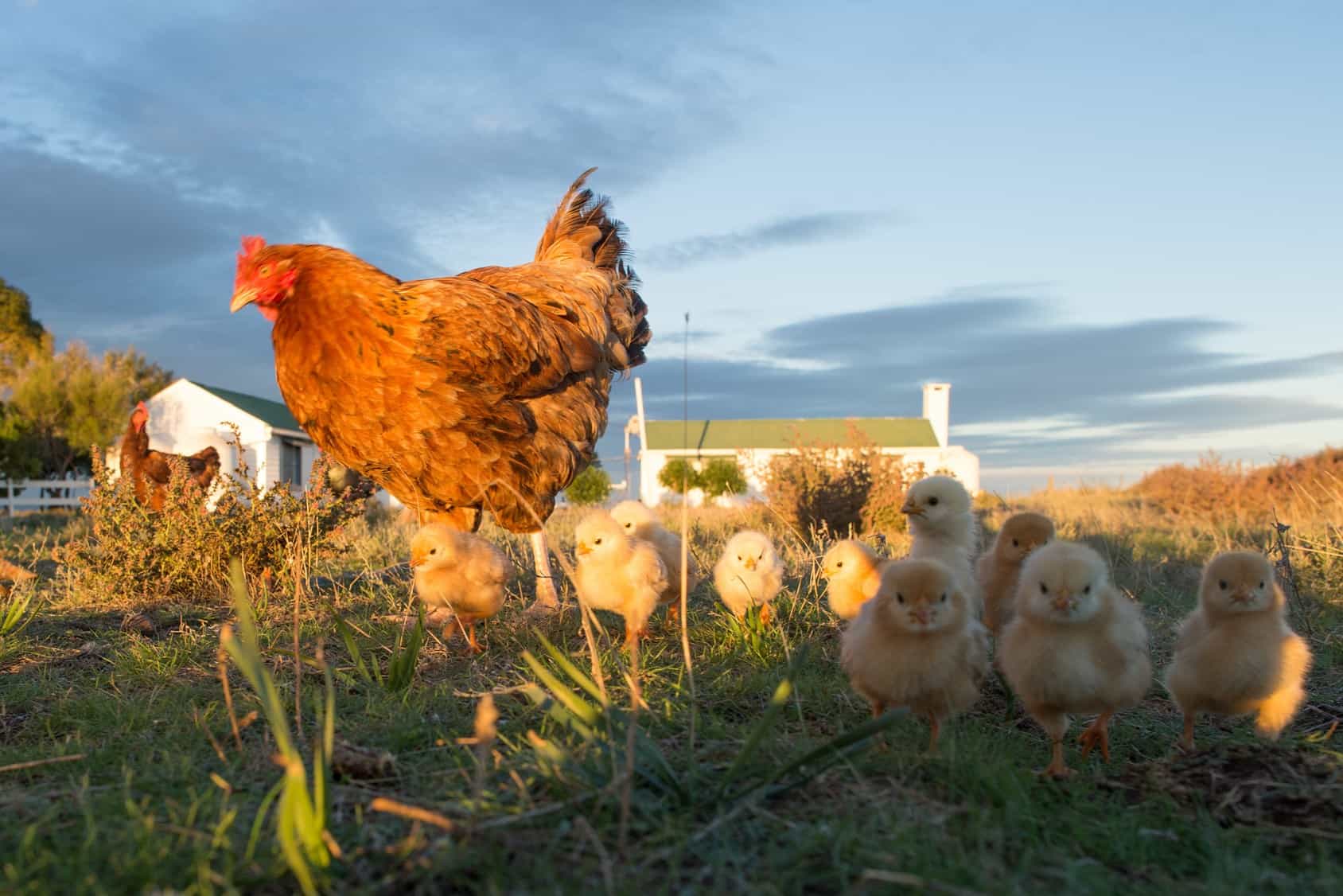
Thanks for sharing the information on the backyard chicken rising.
Extremely good information for beginner farmers. Thank you
Thank you for taking the time to comment!
Hi I want to start a small scale broiler chickens farm but i don’t know where to Sell when is time.